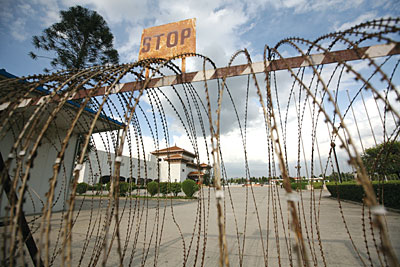 KIRAN PANDAY STALLED FUTURE: The Constituent Assembly, which expended a total of Rs 1.4 billion in two years. |
From the start, constitution-writing has been mired in disagreement. To date, only three committees' draft papers have been passed unanimously. Those committees whose papers made the grade are: the Committee for Rights of Minority and Marginalised Communities, the Committee for Determining the Form of Constitutional Bodies and the Natural Resources and Means Committee. There remain key differences on the form of governance and the judiciary system as well as state restructuring. Additionally, there are 50 disagreements about choices of name, raising issues of political correctness, such as whether to call the conflict an armed rebellion or a people's war.
While it may make sense to extend the CA's tenure in the light of such differences, the decision-making process has not been democratic. The fringe parties have been virtually ignored in the discussions involving the Big Three. "People have been left helpless, without any option but to accept what their leaders decide. The political leaders have taken advantage of this and imposed their decisions on them," says NC CA member Gagan Thapa.
Advocate Sher Bahadur KC feels an extension isn't even legitimate since the CA has failed to fulfil its mandate. Article 64 of the Interim Constitution reads, 'Except otherwise dissolved earlier by a resolution passed by the Constituent Assembly, the term of the Constituent Assembly shall be two years from the date of its first meeting.' The CA can be extended an additional six months in case the task of drafting the constitution is not completed due to the proclamation of a state of emergency in the country.
It didn't have to be this way. CA chair Subhas Nembang may have been able to expedite the process had he taken political parties into confidence earlier and invoked certain constitutional provisions. For instance, the interim constitution clearly called for the formation of a state restructuring commission, but it was only towards the end of the CA's tenure that parties agreed to form one.
Contrary to popular belief, a considerable amount of work has actually been done. CA members collated opinions from across the country and drafted the concept papers to the best of their knowledge. The CA secretariat claims 80 per cent of its work has been completed.
UML CA member Agni Kharel, who is also a member of the Constitutional Committee, recalls that they had initially narrowed down the differences to eight points. When the political differences deepened, they had to vote on 99 issues before submitting the papers to the CA. "We should have decided on the modalities by which the constitution was to be drafted, this would have made things much easier," he says.
Once the battle lines were drawn within thematic committees, CA members could not rise above their parties' interests, which hampered the forging of a consensus on fundamental issues. Unfortunately, their leaders proved equally unable to guide them towards the fulfillment of their mandate.
READ ALSO:
Constitution 2010, Nepali Times coverage of issues related to writing the new constitution
Politics abhors a vacuum, Publisher's note
United we fall, Indu Nepal
Flex-ible, Prashant Jha
Engage the monarchy, Biraj Bahadur Bista
Ready, steady, no?, Dewan Rai
Just questions, Ashutosh Tiwari
Full circle FM, CK Lal
Two seconds to midnight, Ass
Whither constitution writing


